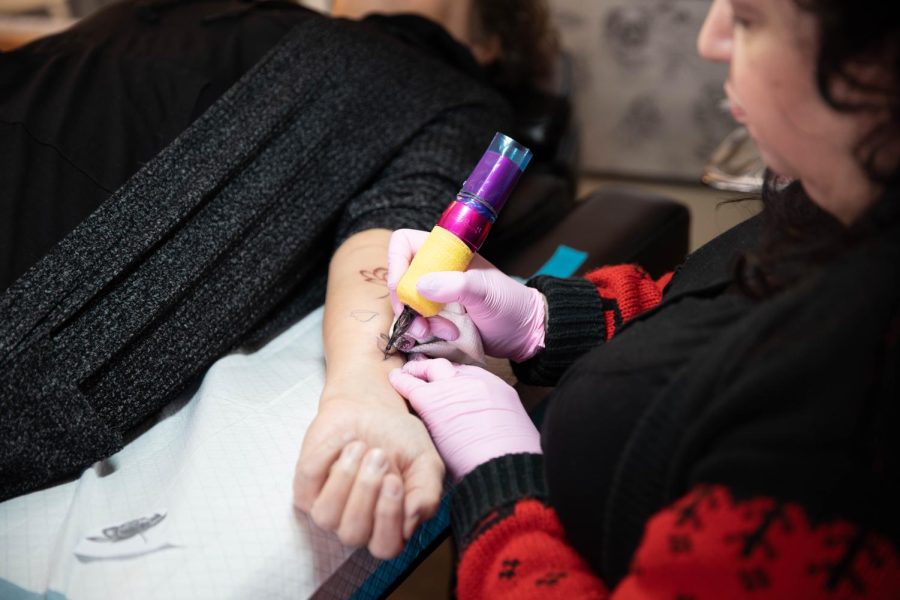‘It was almost like closing a chapter in my life’: A healing journey through tattooing
February 8, 2023
SEX ISSUE
Tattooing can be a powerful tool to adorn one’s body. It can also help people process mental, emotional and physical trauma.
Dawn Grace, a veteran tattoo artist who is proud to say they have a versatile tattoo style, works with breast cancer survivors who have been disfigured by surgical scars.
“A lot of clients…have been without nipples for 10 years, and I’ve had more than a few tell me that they couldn’t bear to look in the mirror because they felt like an actual monster,” Grace said. “No one should have to feel like that.”
A limited number of tattoo artists know how to handle scarring cover-ups from a trauma-informed standpoint, especially when the client has to revisit a source of trauma within the act of healing.
“The tattooing industry is at a point right now where it’s very split between a very old-school mindset of you coming in and dealing with the pain of the tattoo,” said Alexandra Winthrop, a tattoo artist at Evergreen Studios who specializes in scar cover-ups and primarily works with surgery and self-harm scarring.
“But that’s the badass aspect of getting a tattoo versus this more emerging viewpoint of this [being] a potentially healing art that is going on a person with varied backgrounds and varied experiences,” Winthrop said.
Carrying a distinctive, bold design can provide a therapeutic experience after experiencing trauma.
Faith Phillips, shop owner and tattoo artist at Wish Me Luck Tattoo, a Black, trans and queer-oriented shop on Chicago’s Northwest Side, has experienced the healing power of doing tattoo cover-ups and creating a safe space for all identities in her sessions.
Working for the only tattoo shop in the country that has a partnership with the Federal Bureau of Prisons, Phillips has covered gang tattoos for people released the day before. She also specializes in top surgery and tummy tuck scarring and has tattooed nipples on transmasculine clients.
Grace learned how to do 3D nipple tattooing, through a specialty cosmetic tattooing program with the American Academy of Micro-Pigmentation. Now, she is using her practice to make her clients feel like themselves again.
“It’s something that I’ve provided for free,” Phillips said of the nipples, noting that a lot of tattoo artists “aren’t capable of holding space for people like that – or there’s no money there.”
Phillips, who is a transgender tattoo artist, said tattoo artists have one job: to have people leave feeling better than they came in. “Body affirming” is Phillips’ job.
Winthrop agrees that artists should treat everyone with empathy because of the emotional process that tattooing elicits. She said it is empowering to experience a client’s confidence emerge, knowing they have beautiful artwork covering a scar that society often shames.
“It’s something that, when it goes well with a very empathetic and informed artist, can be a beautiful healing experience that can give somebody back so much confidence that they lost in the process of receiving those scars,” Winthrop said. “But when it’s not handled properly, whether it’s a poor tattoo itself or somebody who is not trauma-informed, it can have horrible repercussions for the client. It’s definitely something that I think more tattoo artists need to be aware of and start practicing.”
Every client is unique, Grace said. “A scar on anybody is different from one millimeter to the next; I’ve been doing it for so long that there’s probably going to be a touch up involved, so I tell people that, just because we don’t know how it’s going to heal.”
Stephanie Perejda went to Bella Rose Tattoo for a floral cover-up over the self-harm scars on her arm. The flowers hold significance for Perejda because when she was a child, she picked flowers for her mom on camping trips.
Perejda said the cover-up was life changing because prior to the cover-up, she was forced to wear a long sleeve shirt for years.
“It was almost like closing a chapter in my life and opening a new one and having more positive experiences because I got tattoos to cover up a painful experience,” Perejda said.
Grace has seen many clients cry after getting tattoos that cover up scars.
“[There’s] 100% guarantee there’s tears at the end, which [are] tears of happiness,” Grace said. “It’s overwhelming to be able to look in the mirror and see something beautiful there as opposed to whatever the doctors did.”
Editor’s Note: This story is a part of the Chronicle’s annual Sex Issue which will be published mid-February.








